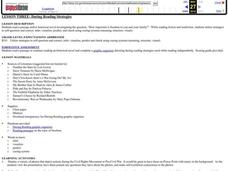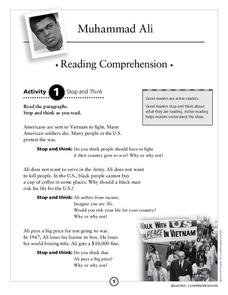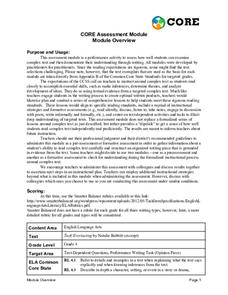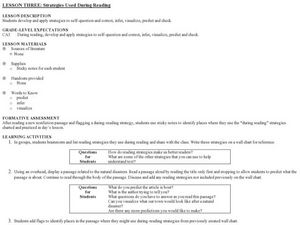Curated OER
Call It a Hunch
Give young scholars a chance to practice making inferences after reading the book Through My Eyes by Ruby Bridges. They confirm whether or not their conclusions are true, have a class discussion, and then independently complete an...
Have Fun Teaching
Where Am I? (15)
Guess the setting in a series of reading passages that allow learners to make inferences. Five short descriptions prompt kids to match one of four settings, based on context clues.
Have Fun Teaching
Who Am I? (14)
What's the difference between a clown and a cashier? Use context clues to infer what each character does for a living in five different reading passages. Kids mark their choices on the space provided.
Polk Bros Foundation
I Can Infer Predictions Based on an Analysis of Motive
Use a character or person's motivation as the basis for a prediction of that character or person's next action. Pupils select an individual from their reading, copy a quote, write down an inference about that character's motives, and...
K5 Learning
Liza's First Spelling Bee
Learners read about Liza's first spelling bee before answering six reading comprehension questions. Skills include identifying similarities, making inferences, drawing conclusions, and answer questions based on explicit information in...
Have Fun Teaching
Making Inferences (8)
Kids examine the clues provided by a prompt to infer what will happen next. They then illustrate the short story.
Curated OER
Poems: "The Rabbit"
In pairs or on their own, fourth graders read the poem, "The Rabbit." They then answer eight critical-analysis questions, requiring them to make inferences, and interpret the poem's meaning and use of language. The reading passage,...
Curated OER
During Reading Strategies
"How important is freedom to you and your family?" The guiding question becomes much more powerful after your class reads and responds to a passage from a historical novel. While reading the passage, they complete a graphic organizer...
EngageNY
Learning About Farms in Colonial America: Explicit vs. Inferred Information
Aid your pupils in understanding the terms explicit and inferred while teaching them about colonial farmers. The third activity in the module builds off the previous activity and focuses heavily on inference. Learners analyze a...
Curated OER
Town Hall: comprehension skills
In this comprehension skills worksheet, learners read the book Town Hall and complete comprehension activities. Students complete 5 activities including synthesizing, main idea/details, making inferences, and drawing conclusions.
Curated OER
An Indecent Chicken?
In this inference worksheet, students read a passage and write a conclusion about what they read and match vocabulary words with definitions. Students complete 11 problems.
PBS
Blue Ribbon Readers: Drawing Inferences
Model for young readers how to use illustrations, chapter titles, and events in a story to draw inferences and make predictions. Learners then practice these essential comprehension strategies by drawing inferences for another section of...
Library of Congress
Muhammad Ali
Muhammad Ali was the greatest, as he'd tell you himself. A set of reading comprehension worksheets walks through parts of Ali's life and promotes individuals to become good readers and writers.
Houghton Mifflin Harcourt
Practice Book: The Boy Who Saved Baseball
An array of reading comprehension, grammar, spelling, and vocabulary activities are at your fingertips with a language arts practice packet. Second, third, and fourth graders work on various skills using reading passages and word banks,...
Curated OER
Inferring Vocabulary Meaning
Explore the meaning of unknown words! Read All I See with your class, having them complete the inference chart provided while reading. They select unknown words, guess their meanings, and identify what other words or pictures helped them...
California Education Partners
Tuck Everlasting
An assessment takes a close look at the story, Tuck Everlasting by Natalie Babbitt, and tests writing abilities. Over the course of two days, scholars read an excerpt, answer questions on a worksheet pertaining to the author's purpose...
Reed Novel Studies
Winnie-The-Pooh: Novel Study
Winnie the Pooh lands in a gorse-bush plant in chapter one of A.A. Milne's beloved children's novel, Winnie-the-Pooh. With the novel study, scholars research three interesting facts about the plant. They also compose a four-line poem...
Reed Novel Studies
A Single Shard: Novel Study
Fulfilling a dream requires a lot of hard work. A study guide for the novel A Single Shard shares the dream of a young Korean orphan. As readers work through the guide, they answer comprehension questions about Tree-ear and the other...
Curated OER
Inferences/Opinions
Fourth graders practice making inferences and forming opinions. In this reading strategy lesson, 4th graders listen to the book Woodsong by Gary Pauisen. They make predictions about the story before beginning and discuss the story as...
Curated OER
Language Arts: Guided Reading with Fancy Dance
Students participate in a guided reading of Leslie Johnson's, Fancy Dance and discover how to sequence events. This lesson plan stresses word recognition, suffixes and prefixes, and sentence structure. Cross-curricular activities involve...
Curated OER
Strategies Used During Reading
Students try a variety of reading strategies. In this reading strategy lesson, students read a nonfiction passage and put Post -Its to mark the spots where they are using a reading strategy. They focus on inferring, predicting,...
Curated OER
Reading Comprehension Paragraph
In this reading comprehension worksheet, students read a 1-paragraph selection and then respond to 6 short answer questions regarding the selection.
Polk Bros Foundation
I Can Sequence Important Events
After reading any short informational or fictional text, ask your class to analyze the important events. They note down three important events on a short timeline, describing the events with either words or drawings. After this, pupils...
Polk Bros Foundation
I Can Identify/Infer Motive
Why do people and characters act as they do? Require your class figure out the motivation of two people or characters they read about in a given text. In the short charts, pupils note down who, what they do, and why they do it. After...
























